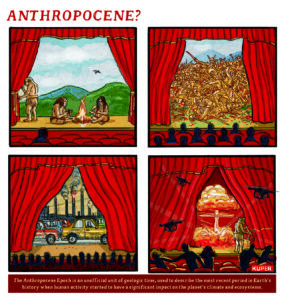What Climate Change Activists Can Learn From Public Health Campaigns
Tackling climate change is urgent. Can we act in time? Yes, one argument runs. What we are doing in protecting public health shows how. A roadside message in India drives the drunk-driving lesson home. (John Hill / Wikimedia Commons)
A roadside message in India drives the drunk-driving lesson home. (John Hill / Wikimedia Commons)
The world’s growing urgency in protecting public health is an encouraging example of what we can do to slow planetary warming, a new group says.
Most climate scientists – and many politicians – agree that the time left for effective action to tackle climate change is frighteningly short. A report due out on 8 October from the Intergovernmental Panel on Climate Change (IPCC) is expected to say that only radical and systemic change now will avert disaster.
One of the report’s co-authors has said already that it will be “extraordinarily challenging” for the world to reach the target of limiting global temperature rise to 1.5°C above pre-industrial levels, and that governments are “nowhere near on track” to do so.
He urges “a real sea change” leading to “a massive, immediate transformation” of global production and use of energy, transport and agriculture.
The 1.5°C limit, agreed by 195 nations in Paris in 2015, is approaching fast: world temperatures have already risen by about 1°C over their historic level.
“We’ve shown in the past that surprising changes are possible … We now know more than ever about how to create the conditions for this kind of change”
But one group of researchers argues that we are not bound to breach it: there may still be time to save the day. In a report they say efforts to alter people’s behaviour so that they address climate change seriously must learn from the great public health campaigns of the past: on smoking, drink-driving and the spread of HIV/AIDS.
Their report (sub-titled “Evidence-based hope”) reviews lessons from campaigns not only for public health but for disaster awareness and equality as well. It is the first publication of the Rapid Transition Alliance (RTA), a global initiative which aims to learn from rapid change to address urgent environmental problems.
It suggests that rapid change may now be more possible than ever. The authors say recent cultural shifts in diet and single-use plastics, sexism and attitudes to gender and identity are examples of accelerating change in society and culture, aided by the speed of new communication technologies and social media in spreading ideas.
The report finds that while measures focused on modifying behaviour have been sidelined in the mix of policies considered for tackling climate change, the past shows that people can change even the most ingrained and addictive behaviours.
Wider changes
Campaigns have succeeded especially when accompanied by transformations in finance, infrastructure and culture and to be effective, the report says, behavioural change campaigns must be linked to wider structural changes.
“The complexity of climate change means that to address it, we’ll need changes in areas ranging from food, to transport, manufacturing, water use, urban planning and finance. To be legitimate and effective, these need to be fair and democratic,” says Andrew Simms, the report’s lead author.
He and his colleagues say such changes are not simple to achieve. For example, cutting smoking in the UK needed legislation on age limits and workplace smoking, public awareness campaigns, taxation and information campaigns, and advertising. They say long-term support and helpful pricing mechanisms will also be essential, even though these can never be enough on their own.
Pollution linked to climate change is already causing unprecedented concern, the report points out. In September the European Union Court of Auditors found that air pollution is responsible for an estimated 400,000 premature deaths a year across the EU. Climate, the report says, needs to be seen in the context of dementia, asthma and deaths from extreme weather.
Tipping point
“Climate now and into the future is set to be among our greatest public health challenges,” says Simms. And that is what encourages him to think that global society may be approaching a tipping point where radical change is possible.
“We’ve shown in the past that surprising changes are possible in how people behave, in smoking, driving, antibiotics, and sexual health. We now know more than ever about how to create the conditions for this kind of change.
“Past radical changes in behaviour are about inclusive cultural movements, not just government campaigns. In moving urgently to address climate change, we should ensure that the onus for change falls on those most responsible for it, and the benefits are shared by all.
“The climate is changing faster than we are”, says Simms. But we can change too. “First, we can’t imagine a situation being different. Then things change and we can’t imagine going back to how they were before.”
Your support matters…Independent journalism is under threat and overshadowed by heavily funded mainstream media.
You can help level the playing field. Become a member.
Your tax-deductible contribution keeps us digging beneath the headlines to give you thought-provoking, investigative reporting and analysis that unearths what's really happening- without compromise.
Give today to support our courageous, independent journalists.









You need to be a supporter to comment.
There are currently no responses to this article.
Be the first to respond.